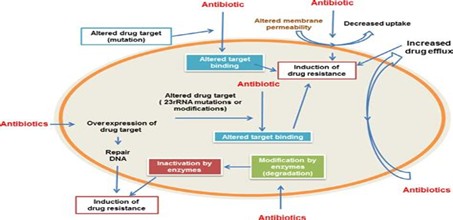The Role of Immune Response in Bacterial Urinary Tract Infections in Iraq: A Review
- Authors
-
-
Shahrazad Ahmed
Department of Forensic Science, College of Sciences, Diyala University, Diyala, IraqAuthor -
Neyaf Alageedi
Department of Biology, College of Sciences, Diyala University, Diyala, IraqAuthor -
Eman Muhsin
Research and Technology Center of Environment, Water and Renewable Energy, Scientific Research Commission, Ministry of Higher Education and Scientific Research, 11001, Iraq.Author -
Doaa Abdulwahab
Department of Forensic Science, College of Sciences, Diyala University, Diyala, IraqAuthor
-
- Keywords:
- Urinary Tract Infections, Bacterial UTIs, Antibiotic Resistance, Immune System, Iraq.
- Abstract
-
Urinary tract infections (UTIs) are among the most prevalent bacterial infections, frequently caused by uropathogenic Escherichia coli (UPEC), the primary causative agent in humans. The immune system plays a critical role in defending against bacterial UTIs by preventing pathogen attachment and colonization in the urinary epithelium, while also mitigating infection severity through innate and adaptive immune responses. This review examines previous studies conducted in Iraq on the immunological aspects of bacterial UTIs. It explores the mechanisms of antibiotic resistance in UTI-causing bacteria and synthesizes findings from 42 studies that investigate the role of innate and adaptive immunity in UTI-related inflammation. Iraqi research has consistently demonstrated a high prevalence of multidrug-resistant (MDR) UPEC strains, underscoring the urgent need for immune-based interventions, such as vaccines and immunomodulatory therapies, to enhance host defenses and reduce dependence on antibiotics. Key findings highlight the involvement of neutrophils, cytokines, and antimicrobial peptides in immune defense against UPEC, while bacterial immune evasion strategies contribute to recurrent infections. This review also emphasizes the necessity for personalized medicine approaches that integrate genetic and immunological insights to improve UTI prediction, prevention, and treatment in the Iraqi population. Numerous Iraqi studies have reinforced the crucial role of innate immunity in determining UTI susceptibility. A deeper understanding of immune mechanisms in UTI pathogenesis is essential for developing more effective treatment strategies and alleviating the burden of recurrent infections.
- References
- Cover Image
-

- Published
- 2025-05-14
- Issue
- Volume 1, Issue 2, 2025
- Section
- Articles
How to Cite
Similar Articles
- Shahad Alwan, Molecular detection of the MexA efflux pump gene in Pseudomonas aeruginosa isolated from Diyala Province , Razi Medical Journal: Volume 1, Issue 3, 2025
- Najwa Belhamad, Boshra Fathalla, Marfoua Ali, Prevalence and Risk Factors of Urinary Tract Infection among Pregnant Women Attending Antenatal Clinics at Some Private Sectors in El Jabal Al Akhdar, Al-Byda, Libya , Razi Medical Journal: Volume 2, Issue 1, 2026
- Dania ELhassan , Mohanned Alwashaish , Salma Lajhar, Aya Aldiab , Khadija Safar, Prevalence, Biofilm Formation, and Antimicrobial Resistance of Uropathogens Isolated from Patients with Urinary Tract Infections in Misurata, Libya , Razi Medical Journal: Volume 1, Issue 4, 2025
- Mahmud Abushhewa, Mohamed Agilla, Ashraf Naass, Khadega Alazoumi, Abdulati Salem, Taj Al-Din Jaber, Mohammed Abdulqadir, Knowledge, Attitude, and Practices about Antibiotic Misuse among Libyan Community: A Cross-Sectional Survey , Razi Medical Journal: Volume 1, Issue 3, 2025
- Nawfal Hussein, Liwar Ahmed, Halder Abozait, Antimicrobial Resistance in Iraq: A Public Health Emergency in the Shadow of Conflict , Razi Medical Journal: Volume 1, Issue 3, 2025
- Raja Moman, Nouralhuda Altair, Abdulkarem Tamer, Amnnah Ghalbun, Nagat EL-Magrahi, Antibiosis of Antibiotics, Honey and Probiotics Related Bacteria to Diabetic Foot Infections , Razi Medical Journal: Volume 1, Issue 1, 2025
- Ahmed Alsharksi, Abdalla Ali, Adam Mustapha, Muna Alshagmani, Bacterial Profile and Their Antimicrobial Susceptibility Pattern of Isolates Recovered from Intensive Care Units of Libyan Hospitals. , Razi Medical Journal: Volume 1, Issue 3, 2025
- Ahmed Atia, Antibiotic Resistance in Libya and the Prevalence of Antibiotic Self-Medication: A Review , Razi Medical Journal: Volume 1, Issue 1, 2025
- Sara Fathi, Heba Hassan, Laila Alfageih, Prevalence of Carbapenem-Resistant Enterobacteriaceae Isolated from Clinical Samples in Medical Tobruk Center , Razi Medical Journal: Volume 1, Issue 3, 2025
- Safaa Shehab, Hiba Awad, Shahrazad Khalaf, Zahraa Dawood, Sabaa Kareem, Fatima Salman, Blood-borne Viral Infections in Hemodialysis Units in Iraq: A Narrative Review of Prevalence and Contributing Factors , Razi Medical Journal: Volume 1, Issue 3, 2025
You may also start an advanced similarity search for this article.








